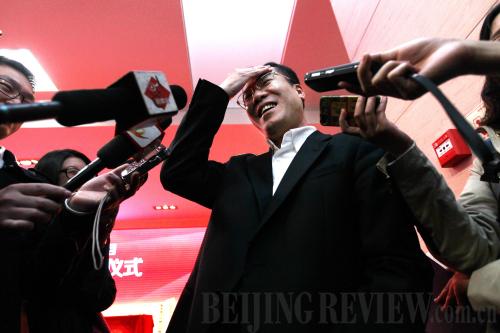|
 |
|
ENCIRCLED: Zhang Zhenyu, head of the Municipal Financial Office of Wenzhou, Zhejiang Province is surrounded by reporters from across the country on March 28, after attending an event on financial reforms in the city. Wenzhou became the nation's financial reform pilot zone in March 2012 (GONG LEI) |
China's central bank is paying unprecedented attention to the stability of the financial sector. On May 24, the People's Bank of China (PBC), the country's central bank, issued the Financial Stability Report 2013, saying that one of the key tasks for 2013 would be to improve the system of monitoring, assessing and disposing of systemic risks, which include local government debt and shadow banking.
When China entered the WTO in 2001, it made the commitment to open its banking sector by 2006. However, little progress has been made in that regard because the central bank is concerned about the possibility of a financial crisis.
But the potential for a crisis in the financial industry is not lessened because of a slow-opening banking sector. The emergence of local government debt and shadow banking poses huge risks to the financial industry.
The financial sector is the core of a modern economy, and financial stability is closely related to a country's economic security. If a financial crisis took place in China before the U.S. crisis comes to a complete end, the world economy would suffer a catastrophe. China's part in defusing risks to the financial system means its role in the global economy is indisputable.
Potential crisis
How probable is a financial crisis in China?
Most people think the Chinese economy is sound, and the present slowdown of economic growth is just a result of intentional control by the government. The risks China's financial system faces, particularly the risks of local government debt and shadow banking, are under control.
However, Yi Xianrong, a researcher with the Institute of Financial and Banking of the Chinese Academy of Social Sciences, says the bigger issue is determining the actual size of the real estate bubble and when or if it will burst, which would hit China's financial system hard. "Without eliminating such risks or squeezing out real estate bubbles, a financial crisis is bound to burst in China," said Yi.
Financial risks are also reflected in the country's broad money (M2) supply. According to the PBC figures, the balance of China's M2 at the end of the first quarter this year was 15.7 percent higher than in the same period last year, and the newly added amount during the first quarter surged by 40.88 percent over a year ago. In comparison, China's GDP in the first quarter only rose by 7.7 percent. The faster growth of M2 over economic growth indicates the presence of bubbles in the financial industry, and such bubbles may cause significant unbalance.
At present there are signs of unbalance, said Yi. On one hand, various monetary and financial indicators maintain high growth, newly added credit surpasses 8 trillion yuan ($1.29 trillion) every year and the official interest rate has dropped; on the other hand, it has become increasingly difficult and expensive for small and micro-sized enterprises to get loans, and the actual interest rate keeps rising. Many are confused as to where the newly added credit has gone. In fact, the credit has never left the financial system: Many new loans are put into banks again to become deposits, and many new deposits are lent out to become loans; financial institutions are borrowing from each other and purchasing financial products issued by each other. Financial credit looks quite active, but actually it's based on "inside circulation." As a result, the debt ratio of the overall economy will be higher and higher, while profitability keeps dropping, which will inevitably drag down the real economy and increase the ratio of non-performing loans and lead to a financial crisis.
|
